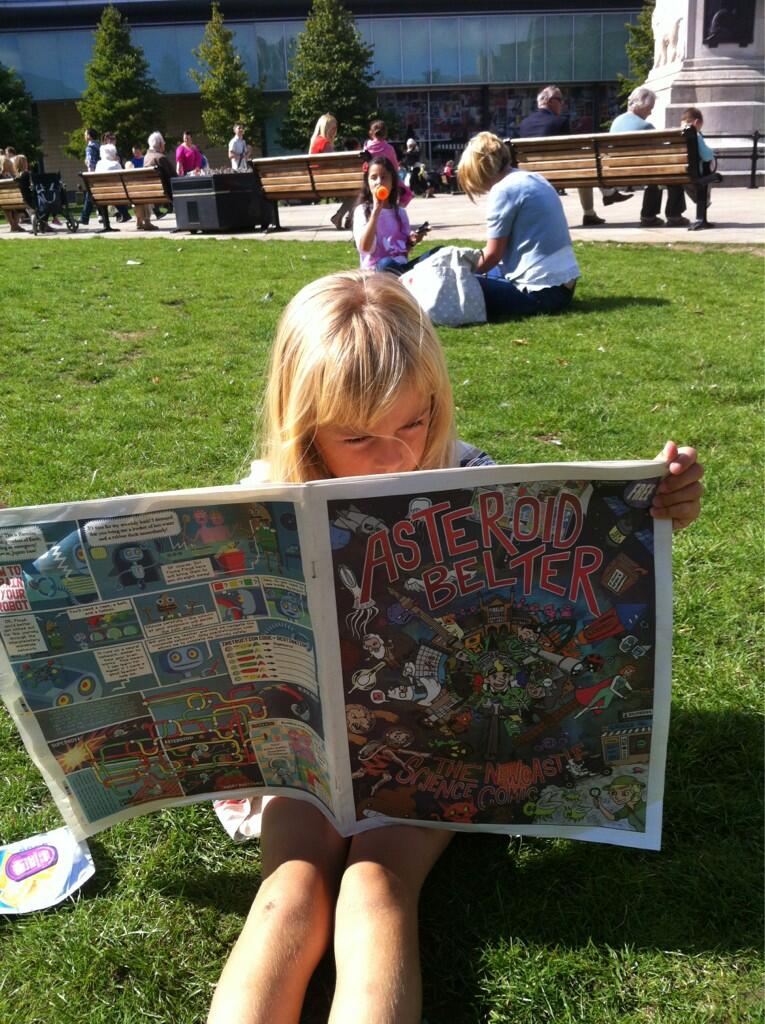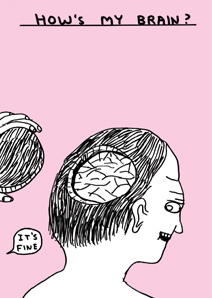
Photo: Newcastle Science Comic
The arts can help keep us well, aid our recovery and support longer lives better lived according to a new report presented to Britain’s House of Commons this week, which will get its full launch tomorrow in Manchester. Presumably, that includes comics reading and comic creation, although unfortunately, the report ignores the medium completely in favour of promoting music, book reading, the wider visual arts and more.
The report of a two-year Inquiry into arts, health and wellbeing, led by the All-Party Parliamentary Group on Arts, Health and Wellbeing found that the arts can help keep us well, aid our recovery and support longer lives better lived; help meet major challenges facing health and social care (ageing, long-term conditions, loneliness and mental health); and that the arts can help save money in the health service and in social care.
The APPGAHW presents the findings of two years of evidence gathering, roundtables and discussions with service users, health and social care professionals, artists and arts organisations, academics, policy makers and parliamentarians from all parties and both Houses. It aims to influence Ministers and officials, the NHS, Public Health England and local authorities, healthcare staff, providers of social care, artists and arts organisations.
The Inquiry was funded by Paul Hamlyn Foundation, the Wellcome Trust and the Arts and Humanities Research Council. The partners in the Inquiry have been the National Alliance for the Arts, Health and Wellbeing, King’s College London, the Royal Society for Public Health and Guy’s and St Thomas’s Charity.

How’s My Brain by David Shrigley
Sadly, comics aren’t mentioned once (even though both the Paul Hamyln Foundation and The Guardian, for example, chose to hire David Shrigley to illustrate their coverage with carton-style art), the report notes the Mental Health Foundation advises reading books (and playing musical instruments) as a way to preserve mental health in older age. It also notes creative writing courses also helped participants with their well-being.
The report offers a set of key recommendations to maximise the potential for the arts to enhance health and well-being outcomes, proposing leaders in the arts, health and social care sectors to establish a national strategic centre for arts, health and wellbeing; the introduction of a cross-governmental strategy to support the delivery of health and wellbeing through the arts and culture; and for designated individuals to be responsible for arts, health and wellbeing within NHS England, Public Health England and each clinical commissioning group, NHS trust, local authority and health and wellbeing board.
“At Paul Hamlyn Foundation, we have always believed that the arts are a force for change, enriching people’s lives and transforming communities,” notes Moira Sinclair, Chief Executive of the Paul Hamlyn Foundation, “so we were pleased to support this important work to shine a light on the links between arts and well-being, and to uncover the excellent practice and evidence to underpin our assertions.
“The findings emphasise the positive impact that arts access and participation have on helping people to overcome disadvantage and enjoy healthier lives and the case studies clearly demonstrate the power that partnerships between health agencies and arts practitioners can have on influencing better outcomes for individual health and wellbeing. We hope that policy makers, health commissioners and programme creators find it helpful.”
“The time has come to recognise the powerful contribution the arts can make to our health and wellbeing,” urges the Rt Hon. Lord Howarth of Newport, Co-Chair of the All-Party Parliamentary Group on Arts, Health and Wellbeing. “We have been privileged to hear moving personal testimonies from individuals who have experienced remarkable improvements in their own health and wellbeing from engagement with the arts.
“This report sets out comprehensive evidence and numerous examples of practice which demonstrate the beneficial impact of the arts. However, we have also found that engagement of the arts in health and social care is unevenly spread and occurs little if at all in many places.
“We are calling for an informed and open-minded willingness to accept that the arts can make a significant contribution to addressing a number of the pressing issues faced by our health and social care systems.”
• The Creative Health: The Arts for Health and Wellbeing report is available to read here
• David Shrigley is online at http://davidshrigley.com | Follow him on Twitter @DavidShrigley
The founder of downthetubes, which he established in 1998. John works as a comics and magazine editor, writer, and on promotional work for the Lakes International Comic Art Festival. He is currently editor of Star Trek Explorer, published by Titan – his third tour of duty on the title originally titled Star Trek Magazine.
Working in British comics publishing since the 1980s, his credits include editor of titles such as Doctor Who Magazine, Babylon 5 Magazine, and more. He also edited the comics anthology STRIP Magazine and edited several audio comics for ROK Comics. He has also edited several comic collections, including volumes of “Charley’s War” and “Dan Dare”.
He’s the writer of “Pilgrim: Secrets and Lies” for B7 Comics; “Crucible”, a creator-owned project with 2000AD artist Smuzz; and “Death Duty” and “Skow Dogs” with Dave Hailwood.
Categories: downthetubes News
 Quantum Leap! We go behind the scenes on Time Bomb Comics flagship anthology
Quantum Leap! We go behind the scenes on Time Bomb Comics flagship anthology  WebFind: CerealMad – British Doctor Who, Star Trek and many other cereal box promotions celebrated!
WebFind: CerealMad – British Doctor Who, Star Trek and many other cereal box promotions celebrated!  Portsmouth Comic Con announces 2024 Talent Search
Portsmouth Comic Con announces 2024 Talent Search  Exclusive: SF thriller “Pilgrim: Secrets and Lies” continues at B7 Comics
Exclusive: SF thriller “Pilgrim: Secrets and Lies” continues at B7 Comics